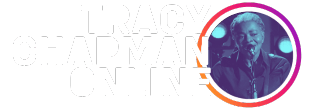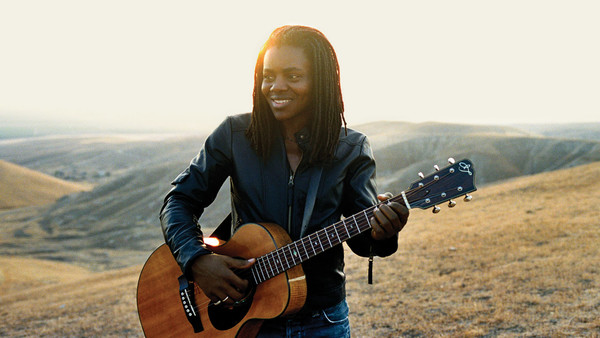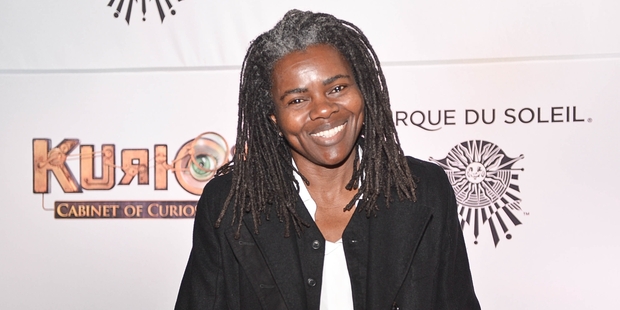By Stephen Holden, New York Times, June 28, 1990
Among the handful of significant new performing songwriters to emerge in the last five years, Tracy Chapman may be the most compelling. But she also seems the most paradoxical.
From the moment two years ago when she released her debut album, ”Tracy Chapman,” which has sold three million copies, the popularity of the singer, who appeared at the Beacon Theater on Tuesday night on a double bill with Johnny Clegg and his band, Savuka, has seemed rooted in contradictions. A black singer whose 1960’s-style folk songs speak simply and eloquently of freedom and dignity, Ms. Chapman has drawn an adoring audience that is predominantly white and middle-class. And although her singing has the inherent authority associated with prophetic voices as varied as Bob Dylan, Joan Baez, Odetta and Miriam Makeba, onstage she appears shy to the point of embarrassment. When the crowd began shouting ”We love you” at the concert, the singer hung her head and waited for the adulation to subside.
It was the first time Ms. Chapman has appeared in New York with a band, and musically, at least, the transition from soloist to a singer working with other musicians seemed reasonably smooth. But during the set, in which she and five musicians performed most of the songs from her two albums (”Crossroads” is the second), Ms. Chapman spoke only a few words. She never introduced her fellow musicians and barely acknowledged their presence.
Except for the absence of refined studio touches, the concert arrangements of familiar songs were essentially no different from those on her records. Ms. Chapman’s stark folk-rock melodies, which echo Neil Young’s more than anyone else’s, comfortably took on the extra weight of chunky arrangements that had no frills. While Ms. Chapman’s singing conveyed a steady authority, it was slightly less assertive than a listener might have hoped.
The songs that benefited the most from the band arrangements were Ms. Chapman’s more oracular expressions, like ”Subcity,” which looks back in style to Mr. Dylan’s ”Positively 4th Street,” and the unsparingly moralistic ”Material World.” In the latter the singer castigates the rich in their ”fancy material world” for failing to see ”the links of chain binding blood.” The song elicited the evening’s harshest and most commanding vocal performance.
Ms. Chapman reserved two of her finest songs – the lovelorn ballad ”This Time” and her brilliant narrative ”Fast Car” – for a solo portion of the show. Listening to ”Fast Car,” one wished that Ms. Chapman would venture more into this sort of compact, social-realist type of storytelling. But it was disconcerting to find many in the audience happily clapping in time to a song that tells a personal story about the cycle of inner-city poverty, despair and single parenthood.
The concert reinforced an awareness of just how profoundly Ms. Chapman’s sensibility has been shaped by the protest songs of the 1960’s and their relatively genteel mixture of moralism and hopeful rhetoric. The connection to an earlier era was underscored by her choice of 1965 Sam Cooke hit, ”A Change Is Gonna Come,” as an encore.
Johnny Clegg and Savuka were an ideal opening act for Ms. Chapman, since they share her strong commitment to black liberation and racial equality. The interracial band, led Mr. Clegg, a white South African who grew up in Johannesburg, has refined a sophisticated international style of pop that blends Zulu guitar and several modes of African percussion with Anglo-American pop. At its most homogenized, the sextet’s music recalls the pop internationalism of the Police and Peter Gabriel, streamlined for the 1990’s. Songs like ”Cruel, Crazy, Beautiful World” and ”It’s an Illusion” conveyed a feeling of international styles spontaneously colliding and fusing.
Mr. Clegg’s virtuosic tribal dancing with his percussionist, Dudu Zulu, and the group’s performance of ”Asimbonanga,” Mr. Clegg’s ringing elegy to the heroes of South Africa’s anti-apartheid movement, provided the set’s kinetic and emotional high points.



